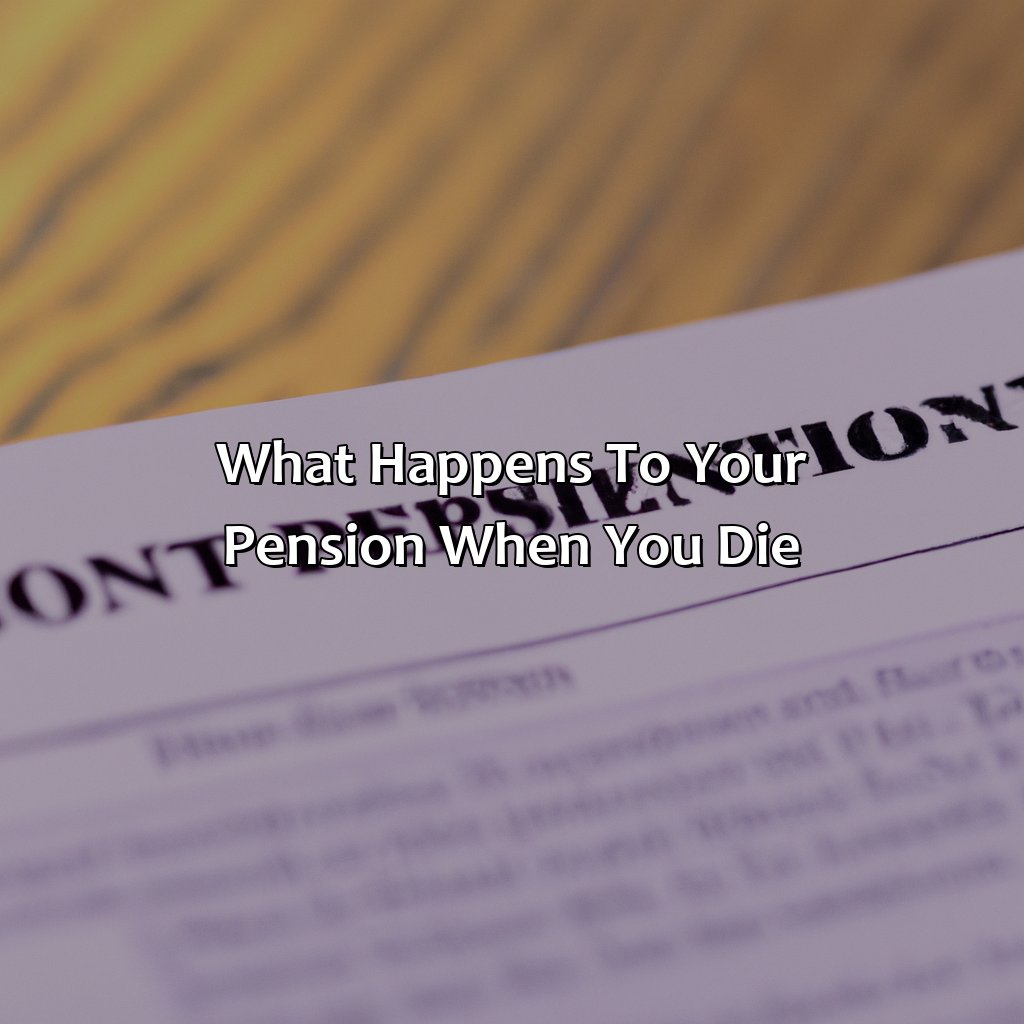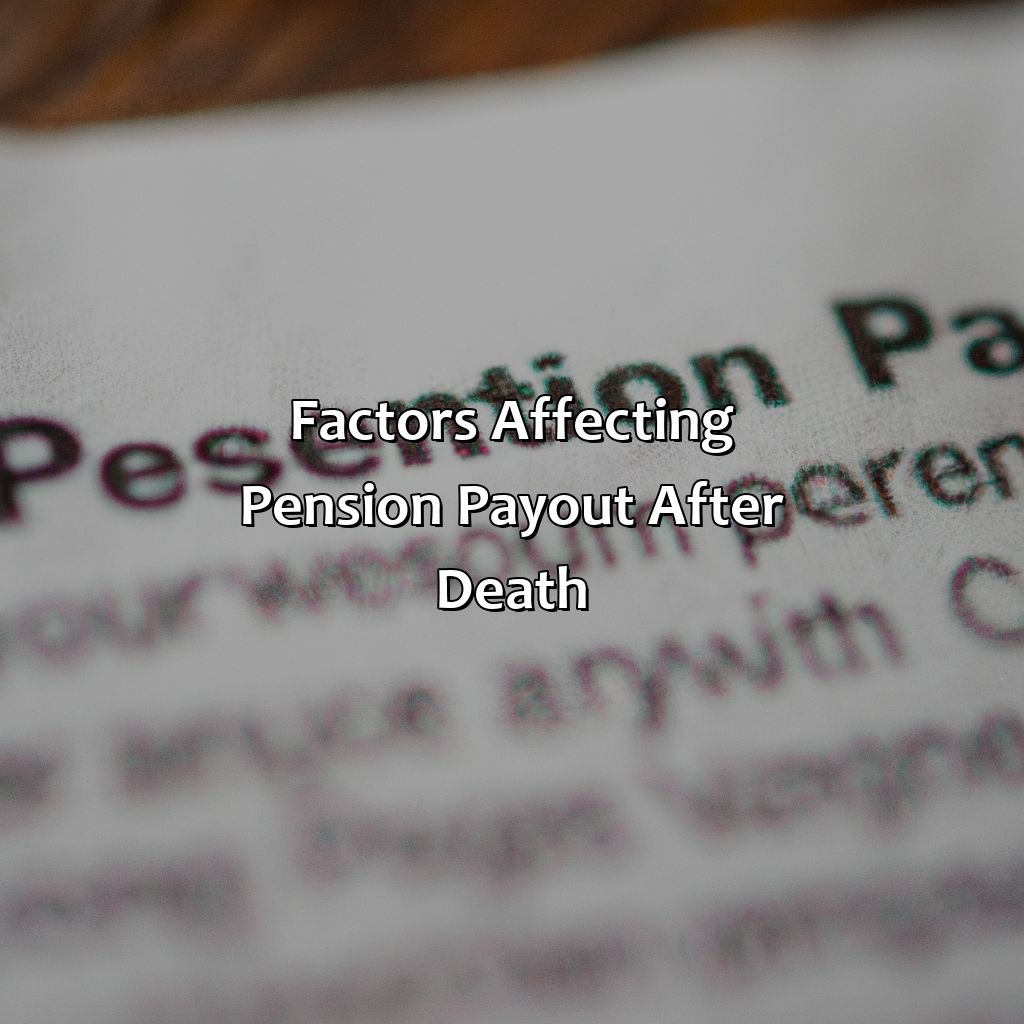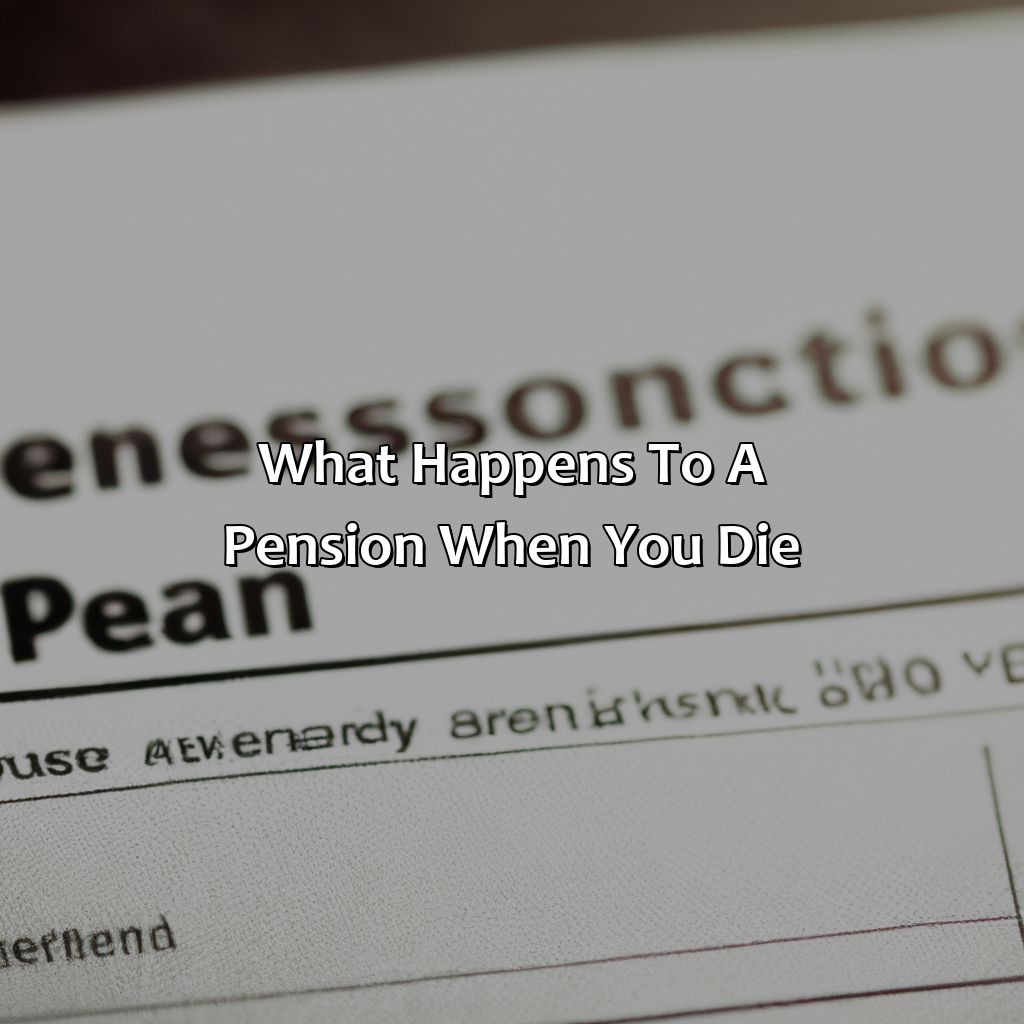What Happens To A Pension When You Die?
Key Takeaway:
- Properly designating a beneficiary is important: To ensure that your pension benefits are passed on to the intended recipient(s), it is important to properly designate a beneficiary on your pension plan. Keep your beneficiary designation updated as needed, especially in case of life changes such as divorce or death of a beneficiary.
- Spousal benefits may vary based on the pension plan type: In most cases, a spouse is entitled to receive pension benefits after the pension holder passes away. However, the amount and duration of spousal benefits may vary based on the type of pension plan you have. Be sure to understand the terms of your plan and how they may impact your spouse’s benefits.
- Factors affecting pension payout after death: The age at the time of death, the time of retirement, and the type of pension plan can all have an impact on the payout of pension benefits after you pass away. Be sure to consider these factors and plan accordingly to maximize your pension benefits for your loved ones.
Are you worried about what will happen to your pension when you pass away? You’ve come to the right place. We’ll help you understand exactly what will happen to your pension when you die and how to make sure it’s handled correctly.
What Happens to Your Pension When You Die?
In case of your demise, your pension funds would sustain your dependents. Your pension can be passed on, and the type of pension you have determines the type of benefits your dependents will receive.
Depending on the type of pension, the funds can either continue to pay out to your beneficiaries for a set period or be given to them as a lump sum. In the event of your death, it is important to inform your pension provider for the benefit of your dependents. Learn more about what happens to your pension when you leave a job.
It is worth noting that, in some instances, if you die before the age of 75, your beneficiaries may receive the pension funds tax-free. This applies to both the lump sum and income that can be passed on to your dependents.
However, if you are a teacher, you may be wondering what happens to a teachers pension when they die.
A man, during his final days, was most worried about his family’s future after his death. Nevertheless, he was grateful for converting a small percentage of his pension into a cash lump sum that he could pass on to his wife tax-free when he passed away. This made him feel more assured of his family’s future, even after his passing.

Image credits: retiregenz.com by Harry Woodhock
Factors Affecting Pension Payout After Death
Factors That Determine the Distribution of Pension After Death
Pension payouts after the death of a beneficiary are determined by several factors. The primary factor is whether the pension plan provides for a survivor’s benefit. If it does, the surviving spouse or partner typically receives a portion of the pension income. Other factors include whether the pension is a defined benefit or a defined contribution plan, the age at which the pensioner passed, and the type of beneficiary designated.
If you want to know how to opt out of teachers pension, visit this link.
In a defined benefit plan, the pension income is usually paid out to a surviving spouse in the form of a percentage of the pension income at the time of the pensioner’s death. On the other hand, in a defined contribution plan, the value of the account is distributed to the beneficiary or beneficiaries designated by the pensioner. If no beneficiaries were named, the estate of the pensioner will receive the distributions.
It’s important to note that the rules governing pension payouts can vary depending on the type of pension plan and the regulations in the country where the pensioner lived. If you’re wondering about what a teacher pension is and what happens to it when you die, it’s best to consult with a financial advisor or other knowledgeable professional in your area.
In the past, some pension plans have allowed lump-sum payments to distribute the pension’s value after the pensioner’s death. However, in recent years, most plans have shifted towards providing a monthly income to surviving beneficiaries. This change is due to increasing life expectancies that make calculating lump-sum payouts more difficult. If you’re wondering about the normal pension age for teachers, you can check out this helpful guide.
The distribution of pension benefits after death can be a complex process. However, staying informed about the beneficiary designations and survivor’s benefit provisions of one’s pension plan can help ensure that the payouts go to the intended individuals.

Image credits: retiregenz.com by Yuval Woodhock
Five Facts About What Happens to a Pension When You Die:
- ✅ If you die before reaching retirement age, your pension may be paid to your spouse or dependents in the form of a lump sum or regular payments. (Source: Pension Wise)
- ✅ If you die after retirement age, your pension may be paid to your spouse or dependents as a regular income or a lump sum. (Source: Gov.uk)
- ✅ If you have nominated someone to receive your pension upon your death, they may be entitled to receive it instead of your spouse or dependents. (Source: Money Advice Service)
- ✅ If you have a defined benefit pension plan, the amount of pension paid to your spouse or dependents after your death may be reduced based on your pension choices during your lifetime. (Source: Citizens Advice)
- ✅ If you don’t have a spouse or dependents, your pension may be paid to your estate upon your death. (Source: Which?)
FAQs about What Happens To A Pension When You Die?
What happens to a pension when you die?
When a pension holder dies, there are a few different things that can happen to their pension, depending on various factors such as the type of pension, whether they had started taking payments, and who their beneficiaries are.
What happens if you haven’t started taking pension payments?
If the pension holder hasn’t started taking payments before they die, the pension can typically be passed on to their beneficiaries tax-free. The beneficiaries can usually choose to take the pension as a lump sum, an income, or a combination of both.
What if the pension holder was already taking payments?
If the pension holder was already receiving payments, the way the pension is handled after their death can vary. Some types of pensions, such as joint annuities or survivor pensions, may continue to pay out to the pension holder’s spouse or partner after their death. In other cases, any remaining payments may pass to the pension holder’s beneficiaries.
Who can be listed as a beneficiary for a pension?
The rules around who can be listed as a beneficiary for a pension can vary depending on the type of pension plan. Some plans allow for anyone to be named as a beneficiary, while others may only allow spouses, partners, or dependents to be listed.
What if there are no beneficiaries listed?
If a pension holder dies without having named any beneficiaries, the pension will typically pass to their estate. This can create additional complications, as the pension may be subject to estate taxes and other fees before it can be distributed to the heirs.
Can you change your listed beneficiaries?
Yes, most pension plans allow for the pension holder to change their listed beneficiaries at any time. However, it’s important to regularly review and update your beneficiaries to ensure that they reflect your current wishes and circumstances.
